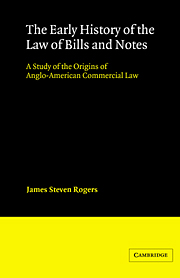 The Early History of the Law of Bills and Notes
The Early History of the Law of Bills and Notes Book contents
- Frontmatter
- Contents
- Preface
- Table of cases and precedents
- Note on citation
- Introduction
- 1 The central courts, commercial law, and the law merchant
- 2 Early exchange transactions: commercial practice
- 3 Early exchange transactions: private law
- 4 Early exchange transactions: public law and policy
- 5 From exchange transactions to bills of exchange: the transformation of commercial practice
- 6 The custom of merchants and the development of the law of bills
- 7 The civilians and the law of bills in the seventeenth century
- 8 Transferability and negotiability
- 9 The law of bills and notes in the eighteenth century
- 10 The problem of accommodation bills
- Conclusion
- Bibliography
- Index
3 - Early exchange transactions: private law
Published online by Cambridge University Press: 22 September 2009
- Frontmatter
- Contents
- Preface
- Table of cases and precedents
- Note on citation
- Introduction
- 1 The central courts, commercial law, and the law merchant
- 2 Early exchange transactions: commercial practice
- 3 Early exchange transactions: private law
- 4 Early exchange transactions: public law and policy
- 5 From exchange transactions to bills of exchange: the transformation of commercial practice
- 6 The custom of merchants and the development of the law of bills
- 7 The civilians and the law of bills in the seventeenth century
- 8 Transferability and negotiability
- 9 The law of bills and notes in the eighteenth century
- 10 The problem of accommodation bills
- Conclusion
- Bibliography
- Index
Summary
Having examined how early exchange transactions were actually conducted, we can now trace the development of the law of exchange and bills of exchange. This chapter examines the private law of exchange contracts in the period up to the early part of the seventeenth century. Just as the common view that the early common law courts did not handle commercial cases in general proves false, careful examination of the evidence indicates that the common law courts, as well as other courts in England, did entertain actions to enforce the obligations of parties to exchange transactions long before the seventeenth century.
EXCHANGE CONTRACTS IN THE MERCANTILE COURTS
In seeking evidence of how courts treated exchange transactions, one must be careful to avoid being misled by incidental references to bills of exchange in early cases that did not actually involve any dispute concerning the rights and obligations of the parties to the exchange transaction. For example, an entry in the London Mayor's Court Rolls dating from 1300 is commonly cited as the earliest action on a bill in the English mercantile courts. The entry, however, merely records that a chaplain complained that his rector had stolen money and delivered it to an Italian merchant in London who gave him a letter of payment addressed to his correspondent in Paris. The Italian merchant said that he had written to his correspondents in various cities asking them not to pay the money, but he had not yet learned whether it had already been paid.
- Type
- Chapter
- Information
- The Early History of the Law of Bills and NotesA Study of the Origins of Anglo-American Commercial Law, pp. 44 - 68Publisher: Cambridge University PressPrint publication year: 1995
